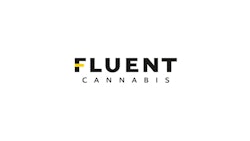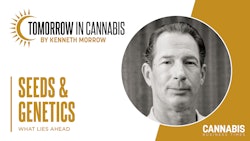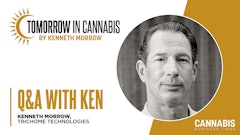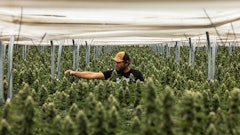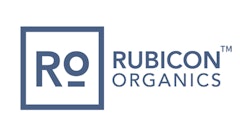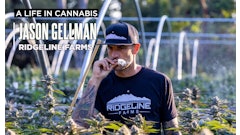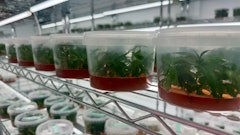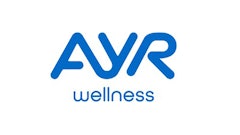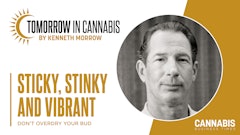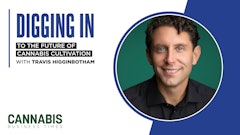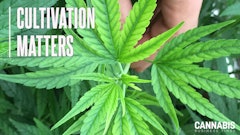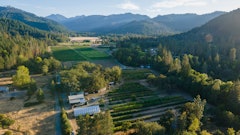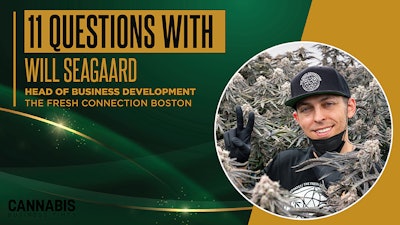
Much like westward-bound pioneers in the 1840s migrated to Oregon and California in search of new economic opportunities, cannabis industry pioneers flocked West at the turn of the 21st century to seek out legalization.
For siblings Will Seagaard and Samantha Seagaard, the West Coast didn’t necessarily represent a final destination but rather a starting point for their now-thriving business: The Fresh Connection Boston, where Will serves as the head of business development and Samantha as CEO. The New Jersey natives co-founded the craft cannabis company in 2018 with partner Zach Swanson, their head of cultivation.
The trio’s soil-grown, hand-trimmed cannabis operation is now equipped with one of the largest genomic libraries in the state, with more than 200 strains grown. But their focus on producing cannabinoid and terpene-rich flower and concentrates predates Massachusetts’ legalization days.
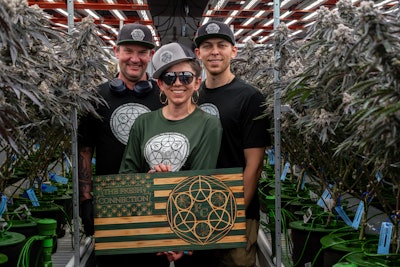 Zach Swanson (from left), Samantha Seagaard and Will Seagaard co-founded The Fresh Connection Boston in 2018.Photos courtesy of The Fresh Connection Boston
Zach Swanson (from left), Samantha Seagaard and Will Seagaard co-founded The Fresh Connection Boston in 2018.Photos courtesy of The Fresh Connection Boston
Samantha, who tested her green thumb as a teenager, was drawn to Oregon’s medical cannabis market when she moved West to attend college. After graduating, she honed her trim skills in California before she began growing and supplying cannabis to Oregon retailers around the time that then-Gov. John Kitzhaber signed legislation in August 2013 to establish regulations for state-licensed medical cannabis dispensaries.
Although Oregon voters legalized medical cannabis in the November 1998 election, dispensaries had largely operated in a legal gray area until President Barack Obama’s then-Deputy Attorney General David Ogden directed U.S. attorneys to take a hands-off approach to prosecuting state-sanctioned medical cannabis activities in an October 2009 memo.
As Oregon’s market expanded to adult use in 2015, Will was working in finance in Massachusetts but would regularly visit his older sister in Oregon to help out during harvest time. From his perspective, he knew legalization would soon expand East.
“I was really focused on figuring out a way to help her take the skills that she had learned and utilize them and kind of bring them home, if you will, so that we could do what she was doing out there, and gained all the knowledge on, and do them out here,” he said. “So that’s sort of in a very short nutshell what happened.”
Massachusetts was the first state east of the Mississippi River to legalize adult-use cannabis in November 2016, paving the way for Samantha and Swanson, an Oregon native whom she met through common friends, to bring their talents to the East Coast. Swanson specifically began his cannabis endeavors as a teenager in the 1980s as a second-generation grower.
Now growing some of the highest-quality cannabis in New England, The Fresh Connection Boston has largely avoided one of the biggest ills of a mature cannabis market: oversaturation.
“For us, we’re not producing huge amounts, so we’re able to turn over our inventory very regularly,” Will said. “I probably have the lowest inventory stock of most people in the state, and I like to keep it that way.”
Below, Will Seagaard details The Fresh Connection’s methods and how the company stands out in Massachusetts’ competitive cannabis marketplace.
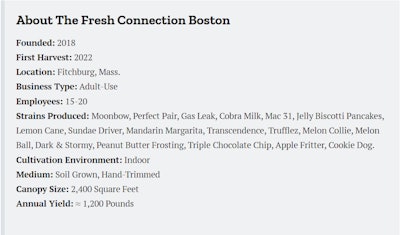
Editor’s note: This interview has been edited for style, length and clarity.
Tony Lange: As a New Jersey native, how did you get into the Massachusetts cannabis space?
Will Seagaard: My older sister is the one who really started in this space, and she had a business out in Oregon. She was supplying medical dispensaries and then worked in the recreational cannabis space out there. And I was living in Massachusetts, working in finance, always was interested in the industry, and knew that eventually it would be going legal here on the East Coast, in the Northeast, where we are from.
We had a farm in Oregon as well, where we grew hemp and did CBD products and all kinds of stuff, but really, the focus for me was always the Northeast and focusing on how we could do that legally over here. So, in 2016, the laws changed, everything got passed, and then we immediately started looking for a building and some space here in which to do this. We finally bought our building in 2018, took about four years to go through all the licensing and the build-out, and all that good stuff. Once we finally did that, we opened in 2022, and we’ve been successful up until this point.
Lange: How did you and Samantha connect with Zach to co-found The Fresh Connection Boston?
Seagaard: Zach was working out in Oregon as a medical cultivator. Samantha and Zach had some mutual friends, and she was looking for an operational partner to help her on the cultivation side. And so that’s sort of how things transpired there. That was before she was focused on coming back to Massachusetts, but they started working together, and things were going well. Zach has a ton of knowledge and really handles most of the cultivation, like plant-specific items. And I think he just saw that there was a big opportunity and a huge market out here to capitalize on, and he has a wealth of knowledge and wanted to share that a bit with the world in his own way.
Lange: With roughly 200 licensed cannabis cultivators in Massachusetts, what makes the quality of your flower stand out in the state marketplace?
Seagaard: I think it’s all the attention to the little details that we put into it, and just the small-batch nature of what we’re doing. We don’t have a huge facility. We’re just laser-focused on putting out the best of the best across the board, from the genetics that we have to our processes to all those things that have been honed over decades of experience. All it takes is one misstep, and you can ruin the whole batch, so you really need to make sure that every little detail is covered. And so, it’s really just our experience and the fact that we’ve done it so many times and have messed up a lot of batches in the past, but we’ve learned from that and just learned from all those mistakes to make sure that they don’t get repeated. And then trying to impart all of that on our team. Ultimately, we’re only as good as the team we have behind us, and we’ve been able to find some great, key people here in Massachusetts as well to help. And they love what they do. We love what we do. So, it makes it just a little bit easier every day.
 Samantha Seagaard, CEO, and Will Seagaard, Head of Business Development, The Fresh Connection Boston.Photo courtesy of the Fresh Connection
Samantha Seagaard, CEO, and Will Seagaard, Head of Business Development, The Fresh Connection Boston.Photo courtesy of the Fresh Connection
Lange: So, was there a memorable mess-up that you learned from that stands out?
Seagaard: I think by the time we got to Massachusetts, we had most of our “uh-oh” moments out of the way. Once we got here, it was more just about dialing in all the systems that we have in place, because it’s so dependent on the environment, right? Here in Massachusetts, the seasonal humidity variations are something you have to focus on and deal with in your production facility. Those things have a huge, huge impact on your process and the environment, and ultimately what you’re going to do with your products, because you can’t work with them if the room is 0% humidity or 95% humidity.
Lange: What cultivation method will the Fresh Connection stay true to and not cut corners on or stray away from?
Seagaard: We’re not going to grow things that aren’t in soil for one. That’s really what gives, in our opinion, the product its appeal. That’s why we’re not the same as a lot of these other huge, mass-produced items; a lot of it comes down to the soil, and that we’re doing things by hand. So, we’re able to take the time and the care to make sure that everything you’re getting has been looked at by a team of people, not just one person who might miss something. It’s been looked over by a team of people, so you can ensure that every single harvest you get it’s going to be the best it can be.
Lange: What’s something you’re doing differently in 2025 compared to when The Fresh Connection first got its start, and how has that made a difference?
Seagaard: We do a ton of R&D every single day in our facility. We have an in-house testing lab that we can see essentially throughout the whole grow cycle what the plant is producing for cannabinoids, which allows us to dial it in based on that and adapt our growing practices so we can get the maximum output. We track everything and just make sure that we’re laser-focused. It’s all about the small stuff, and that’s what we’re super focused on. We check trichomes before we harvest, we always look at everything under microscopes and just make sure that it’s at the optimal ripeness, and you really want to shoot for a certain level of finish on the trichomes so that they all haven’t turned to CBN or anything like that, but also not harvest too early where it hasn’t finished up that production. And that depends on what strain we’re producing.
 Jelly Biscotti Pancakes - An extremely fragrant cross between Biscotti Pancakes x Jealousy this strain has a sweet/creamy vanilla aroma with a hint of umami notes on the finish. Photo courtesy of The Fresh Connection
Jelly Biscotti Pancakes - An extremely fragrant cross between Biscotti Pancakes x Jealousy this strain has a sweet/creamy vanilla aroma with a hint of umami notes on the finish. Photo courtesy of The Fresh Connection
Lange: How many strains are you currently cultivating, and how do you decide what you’re going to grow in each cycle?
Seagaard: At any one time, we might have 20 strains at different stages of the cycle, whether it’s pheno-hunting or in full production or anything like that. We have almost 250 strains in our library. And we don’t run all of them all the time, but we’re constantly looking for that new next best thing. A lot of it comes down to what we have in inventory, and we do a lot of phasing things out. So, we’ve grown quite a few things that we did a run of, but it doesn’t quite hit our specs as far as keeping it in the rotation. And so, we phased it out, or we found something else, and we’re just like, “OK, we don’t have room to keep all of this going,” because we found something ever so slightly better.
Lange: Do you have a traditional bestseller?
Seagaard: Our sativa strains always sell, usually. It’s really dependent. We’ve got a couple of strains that we’re pretty well-known for, like our Moonbow. We actually had one that everybody loved, but it just did not produce the way we needed it to in order to make it economically viable to run for us. So, we had to pull that out of rotation, but that one was amazing—our Jelly Biscotti Pancakes. And then our Mac 31, which is our pheno of the Mac strain, everybody loves that. That’s been a top seller for us pretty consistently. We don’t always grow it. We do it in phases just because we don’t have enough space to keep growing the same strain on repeat. So, we’ll do a cycle of it, and then it might be six, eight, or 10 months before we bring it back.
 Perfect Pair - This frosty strain is a cross between Kush4BReakfast's wonderfully soothing Smarties and Tiki Madman's energizing Devil Driver.Photo courtesy of The Fresh Connection
Perfect Pair - This frosty strain is a cross between Kush4BReakfast's wonderfully soothing Smarties and Tiki Madman's energizing Devil Driver.Photo courtesy of The Fresh Connection
Lange: What’s the most invaluable piece of your operation that helps ensure your product quality and consistency with each and every grow?
Seagaard: I would say the people, first and foremost. You can’t replace that, because nothing is infallible, right? You might have an amazing piece of equipment, but if you don’t have somebody who knows how to use it, it’s useless. You’ve just got to make it a good place to work and make it a place that everybody wants to be a part of. That’s kind of been our mantra. And we don’t ask any of our employees to do anything that we probably don’t actively do ourselves. So, I think that’s an important piece of it, and properly compensating people for their time and understanding that they’re people too, and things come up. Also, we are there training them directly and managing things directly on a day-to-day basis, so we know about things being problems before they become major issues, because we’re there. I think that’s the key.
Lange: What’s been your biggest challenge in the Massachusetts marketplace?
Seagaard: It depends on where in the process we’re talking. Obviously, the regulatory environment is pretty intense here in Massachusetts. It’s the home of bureaucracy, essentially. Our state government is older than the U.S. government, so they like their rules a lot. But I think aside from that, it’s a very, very competitive market. And so, you have to have your finger on the pulse of what’s going on. For us, we’re not producing huge amounts, so we’re able to turn over our inventory very regularly. I probably have the lowest inventory stock of most people in the state, and I like to keep it that way, but it doesn’t make it any easier necessarily to keep all the balls in motion.
Lange: A big storyline in Massachusetts has been the falling prices at retail. Flower is selling at around $125 per ounce when three years ago it was more than $300 per ounce. How has that impacted you as a grower?
Seagaard: It’s definitely tightened our margins quite a bit. We’re probably more insulated than a lot of the bigger companies just because of the size of our production. But you definitely feel it. Everybody’s getting squeezed a little more every day. That being said, we do have some amazing retail partners, so they’ve all in all been great to work with. I think we’re fortunate in that we haven’t been affected quite as much as a lot of other people have. But there’s a confluence of factors that determine what [local] markets we can do business in. On my side, I can’t really control the economic environment, so I try not to sweat it quite as much and just focus on the things that we can control.
 Will Seagaard, Head of Business Development, The Fresh Connection BostonPhoto courtesy of The Fresh Connection
Will Seagaard, Head of Business Development, The Fresh Connection BostonPhoto courtesy of The Fresh Connection









